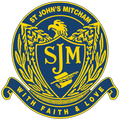Learning and Teaching

Professional Learning at St John’s
Professional Learning Meetings (PLMs) Term 2, 2020
Every Monday and Tuesday afternoon St. John’s staff have attended Professional learning meetings (PLMs). These PLMs relate directly to our Annual Action Plan and provide rich professional learning as we grow and develop shared understandings. PLMs are led by our leadership team members across all spheres - Leadership and Management, Learning and Teaching, Student Wellbeing and Education in Faith.
PLMs this term included:
- Remote Learning
- Wellbeing (childhood anxiety)
- Visible Learning
- Learning Diversity
- Digital Technology
- Math - Data analysis
- Religious Dimension
- Writing and Assessment
- School Improvement Plan
- Reading - Data analysis
- Data Analysis and Planning
- Pedagogical Frameworks
- NCCD
- Inquiry Learning
Professional Learning
This term a number of staff members attended professional learning days and network days and undertook professional courses online in their own time. We feel it is important to share with the school community, an overview of what staff members have been learning.
BeYou - All School Staff
All staff completed modules within the BeYou program, an online course with a focus to provide educators with knowledge, resources and strategies for helping children and young people achieve their best possible mental health.
Assessment in Remote Learning - Naomi Ryan and Shannon Kearns
The focus for this online course was to identify and implement effective collection of data through assessment during Remote learning, using the 4 A’s of Assessment.
Problemo - Australian Math Trust - Kellie Cumming
The focus for this online professional development was training of the pilot program - Problemo through the Australian Mathematics Trust. This online platform contains over 150 math problems for Year 5 and 6 students, aligned with the Australian curriculum. The problems can be set as challenging tasks in a classroom environment or can be utilised to assess students in test situations. The webinar provided an opportunity to understand how this program can be utilised at St John’s.
Anxiety in kids during Coronavirus - Kim and Shannon
The focus of this course was to learn how to identify anxiety within children and how to minimize anxiety through a combination of strategies.
Positive Partnerships - Returning to school: Preparing for change - Emma
This webinar focused on student return to school following Remote Learning. It included strategies on how to best support students during this challenging time. All staff enagaged in a summary of these strategies during the school closure day.
Anxiety Strategies during COVID19 - Emma, Kim, Carmel, Connie
This webinar focused on psychologist recommended suggestions on how to support students experiencing anxiety during this COVID19 period.
Literacy Leader Networks- Naomi
During these two online networks time was spent exploring how other schools were teaching Literacy during Remote Learning and what strategies they were using to assess students at this time.
Schools in for Refugees - Monica
The content covered in this online workshop included:
·Experiences of young people from refugee backgrounds including prior education experiences
·The impact of trauma on young people’s learning and wellbeing
·The role of teachers and schools in supporting recovery from trauma
· An introduction to a whole school approach and key areas where schools can increase support for refugee background students and families; and
·Strategies that support the recovery process for teachers and other staff to use
Learning and Teaching Network- Shannon
The focus of this networking meeting was to explore Parent Learning Conferences and conversations, collaborative goal setting and sustaining these relationships.
Marketing 'Word of Mouth'- Hosted by Dr Stephen Holmes - Verona Gridley
Word of Mouth is not just about referrals to achieve enrolments, it also adds credibility to a message. A friend or family member talking about a brand or school, or an independent commentator writing about it, tend to be believed more readily than commercial advertisers talking up their own brands.
Critical Quarter - Verona Gridley
The aim of this program is to arm leaders moving into new principal roles with a suite
of critical tools and approaches for ensuring they transition to the new role as quickly
and successfully as possible, and make a valuable and positive contribution from day
one. In doing so, it also points out potholes and pitfalls that may appear along the
way by making these traps more visible and thus easier to avoid.
Lit leaders Networks - Ange Crowe
Reading Recovery networks x 2 - how to support our readers in remote learning and how to organise the next steps in their learning.
Learning Diversity networks x 2 - how to support our students' in remote learning and how to support their return to school.
User Level B accreditation - Because our school was engaged with the Intervention Framework, CEM have entered into a partnership with Pearson Clinical Australia to train some very lucky teachers in statistics and the administration, scoring and interpretation of standardized assessments to gain a User Level B qualification to allow us to administer the full range of User Level B assessments. For example, Kaufman Brief Intelligence Test, Weschler Individual Achievement Test, Keymaths, Peabody Picture Vocabulary Test, Raven's Progressive Matrices.
Shannon Kearns
Learning and Teaching Leader
Reports - Semester One 2020
Next week, parents will be able to view their child/children's reports through the Parent Portal. Just as schooling was very different for this first semester of 2020, so too will be the reports.
Assessment does not only take place at St John’s around report writing time. Staff at St John’s are consistently assessing students all the time. This also included during Remote Learning, through tasks assigned and submitted, Google Meets and telephone conversations with students and families by teachers and Learning Suport Officers. Assessment is the process of gathering and interpreting evidence to make judgements about students’ learning. Assessment is used by learners and their teachers to decide where the learners are at in their learning, where they need to go and how best to get there.
The Semester One 2020 Report will include a succinct descriptive assessment of student learning achievement for the areas of English. Mathematics and Religious Education based on the Achievement Standards in the Victorian Curriculum. This assessment will refer to data collected in Term One, during the weeks of Remote Learning and finally the recent weeks back at school. A comment on how the student adjusted to the remote and flexible learning environment, with reference to the ‘Personal and Social Capability’ curriculum will also be included. Staff at St John's felt that we had sufficient assessment evidence and so decided to provide students with a mark for the areas of the Victorian Curriculum areas taught. More information regarding content taught can be found in Termly Overviews which were sent home at the beginning of both terms.
Students have been asked to reflect on their learning in both terms and have composed a comment for the report.
The end of year report (December) will provide a more comprehensive view of the year’s learning across all usual curriculum areas. Other important components of our reporting processes such as the Student Learning Folios will be sent home at the end of Term Three and at the end of the year. Student/Parent/Teacher learning discussions will take place at the end of Term Three as planned and advertised at the beginning of the year.
Australian Mathematics Competition 2019
The Australian Mathematics Competition is an optional activity available to students in middle (Yr 3/4) and upper primary (Yr 5/6). It is a one hour math test involving 25 multiple choice and 5 questions involving a number answer, with an emphasis on problem solving strategies. Students wishing to enter the competition need to place $6.50 (competition entry fee) in an envelope with their name and the heading – Australian Math Competition on the front of the envelope and return it to the school office by Friday 26 June.
The competition will be held during school hours in mid August.
Further information can be found at Australian Maths Trust or if you have any queries chat with Kellie Cumming or email kcumming@sjmitcham.catholic.edu.au.
